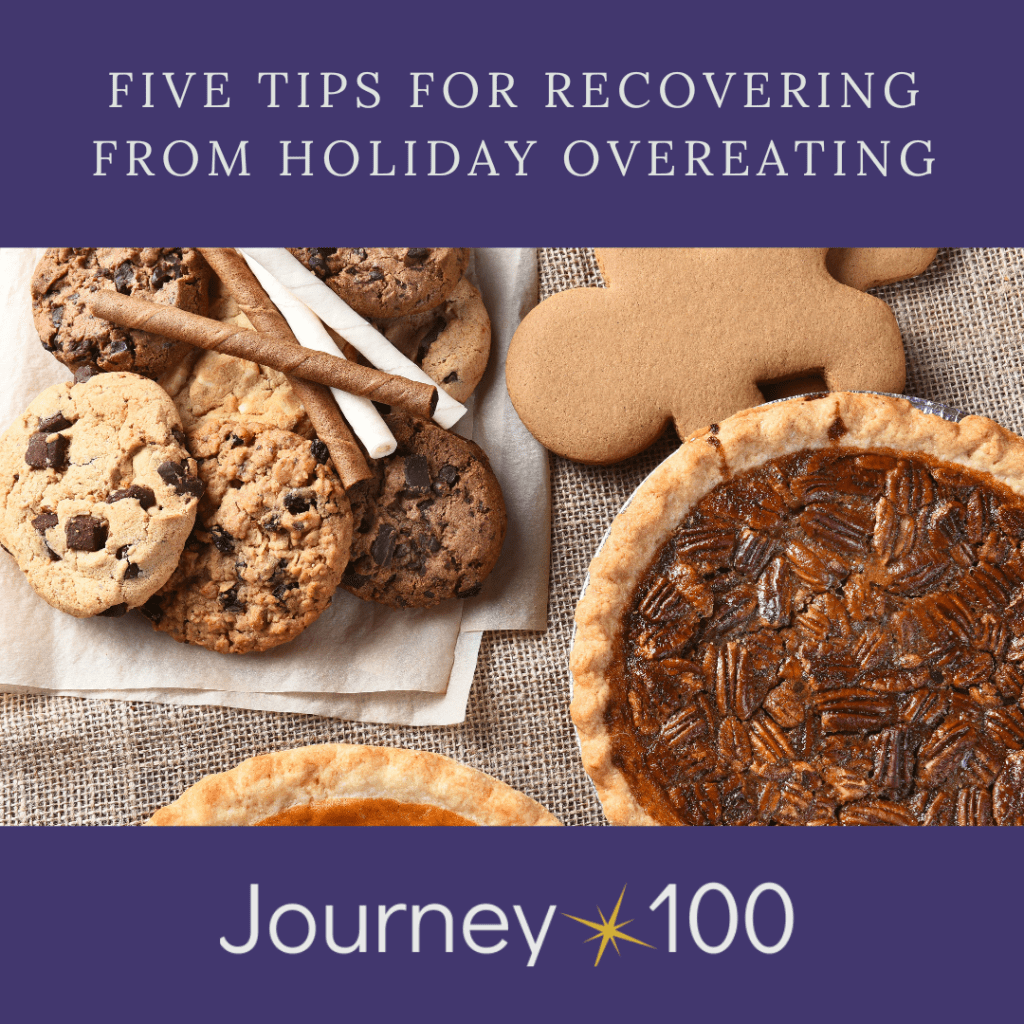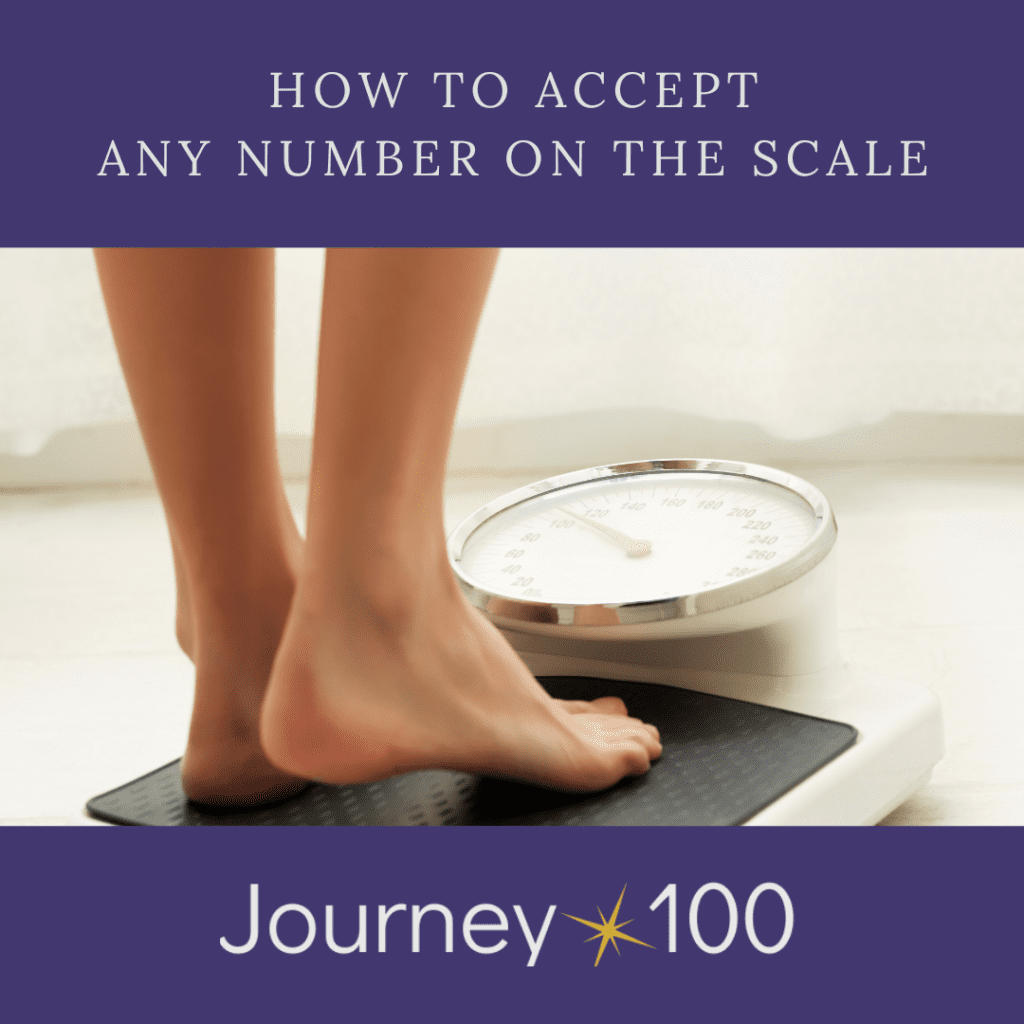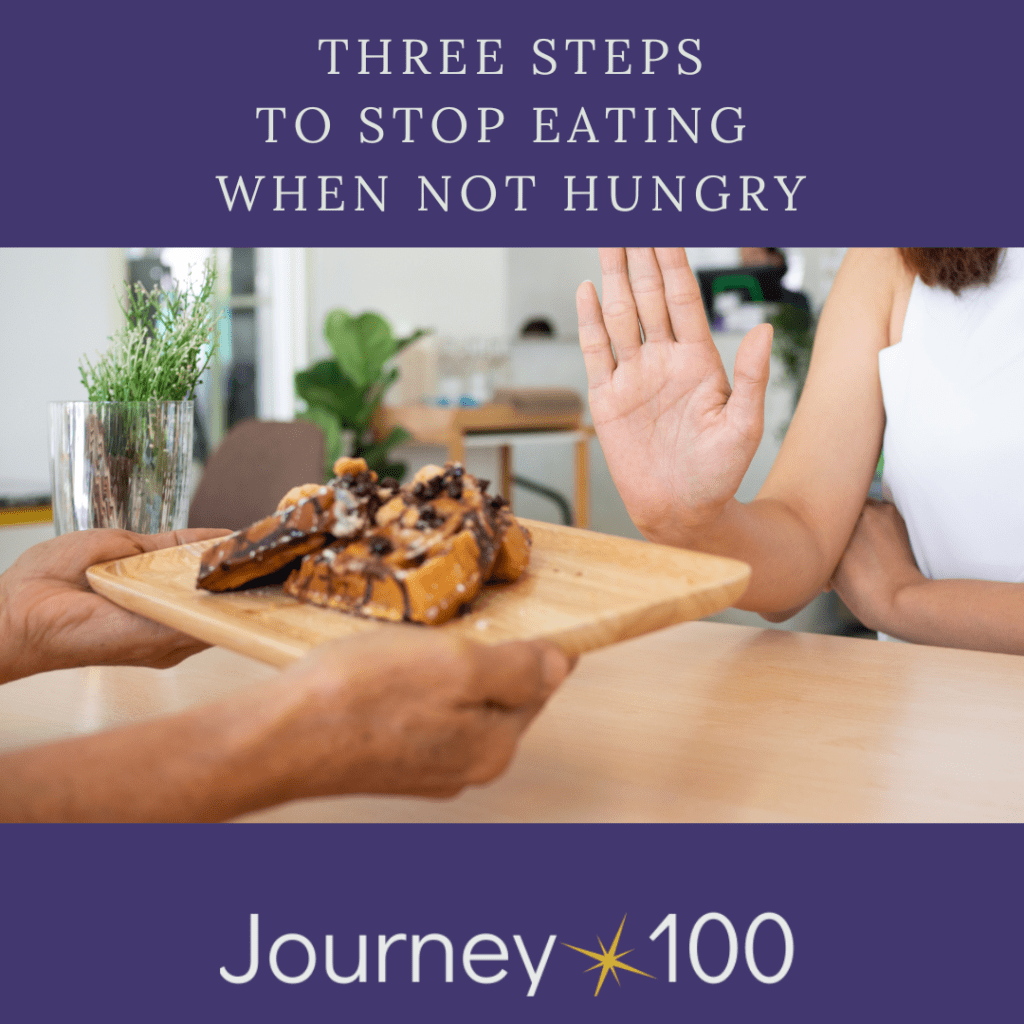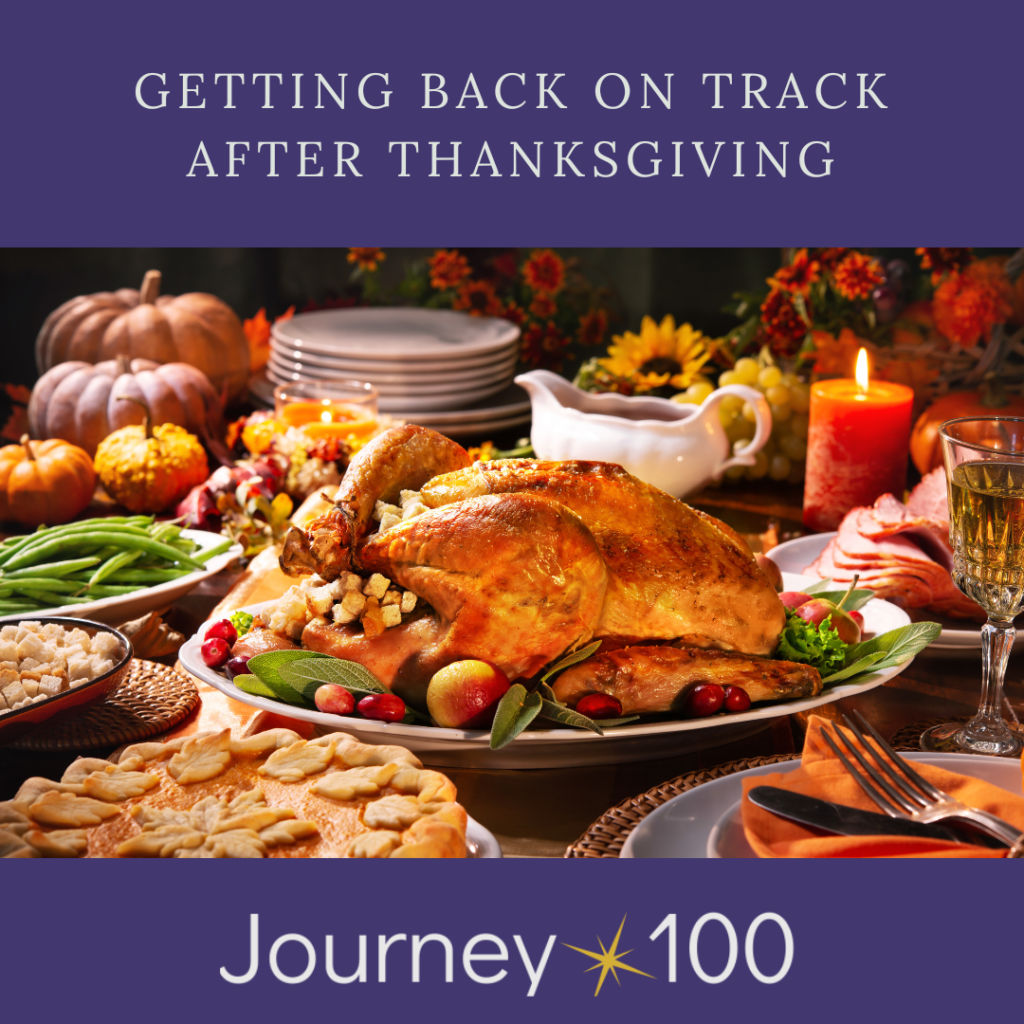Five Tips for Recovering from Holiday Overeating

The holiday season is marked by good times with family and friends plus delicious, holiday treats. If you have been overeating these holiday treats, then these five tips on recovering from holiday overeating are for you! 1. Hydrate, Hydrate, Hydrate: After indulging in holiday goodies, prioritize hydration. Water is your body’s best friend when it comes to flushing out toxins and aiding digestion. If you overindulged in alcoholic drinks then you are likely dehydrated and in need of hydration. Grab your trusty water bottle and make it your sidekick throughout the day. Not only will it help detoxify your system, but it can also curb those lingering sugar cravings. 2. Reconnect with Nutrient-Rich Meals: Reset your system with nutrient-packed meals. Think fresh veggies, lean proteins, and whole grains. These foods provide the essential nutrients your body craves, helping stabilize your energy levels and getting you back on track. I love using this technique as a way to focus on what TO eat rather than restricting other foods. This way you focus on nutrients and naturally crowd out room on your plate for other, less nutritious foods. 3. Move Your Body in a Way You Enjoy: Banish guilt and embrace movement that brings you joy. Whether it’s a brisk walk, a dance session in your living room, or a calming yoga class, find an activity that feels good for you. Physical activity not only burns those extra calories but also boosts your mood, helping you regain that post-holiday feel good vibes. 4. Plan Your Meals and Snacks: Creating a plan can be a game-changer. Outline your meals and snacks for the day to avoid impulsive choices. Planning ahead helps you make mindful and balanced food decisions, ensuring you nourish your body without feeling deprived. 5. Practice Mindful Eating: Savor each bite and be present during meals. I like to practice mindful eating by always sitting at a table to eat, limit conversations and make sure my phone (or TV) are not in sight. Mindful eating allows you to recognize true hunger and fullness cues, preventing overeating. Put away distractions, engage your senses, and relish your food consciously. Remember, we’re all human, and a little indulgence during the holidays is perfectly normal. It’s the actions we take afterward that truly matter. Treat yourself with kindness and use these simple tips to guide you back to feeling your best. Here’s to a healthy and vibrant start to the year ahead! Your Coach, Andrea
How to accept any number on the scale

Far too many of us hold the scale as the final authority on whether or not we are doing weight loss right. If we see a loss less than the gold standard of two pounds, we tell ourselves it’s “just” a pound or not really a loss at all. Here are three ways to accept any number on the scale. Remind yourself that fluctuations happen Lots of things can affect your body weight. Water consumption, salt intake, time of the month, illness, and bowl movements can all affect the number on the scale. It’s important to remind yourself that not all blips on the scale are a result of our habits. Weight naturally fluctuates anywhere from two to four pounds day to day. Embrace this as a part of your journey and don’t freak out. Don’t reside in La-la land either. Blips week after week on the upward trajectory is a sign of weight gain and needs a closer inspection of your daily habits. In either case, you can accept the number on the scale by reminding yourself that this number is never fixed. The number is meant to go up and down and you can always take action to change it. Always err on the positive side Small, downward blips can also be attributed to natural fluctuations but you get a choice to count it towards progress or something fleeting. Always erring on the positive. Count it towards your progress. Why? Because when you tell yourself you’re a little closer to your goal, you’ll feel more motivated to take more action and confident that you will eventually hit your goal. When you tell yourself that it’s not really a loss or that it’s just a weight fluctuation, you’ll feel inadequate and disappointed. It’s much easier to accept the number on the scale when you tell yourself that it’s evidence of progress. There is no downside to counting it. Embrace every win, no matter how small and insignificant you may think it is. You are in control When the number goes up, and it will, remind yourself that no number on the scale is ever final. This helps accept the number for what it is: temporary. As mentioned before, normal weight fluctuations will move the number up and down regularly. Even if you gained a large amount of weight, it serves you to remind yourself that no number is final. A change in your habits caused the weight gain and a change in your habits can help you lose it. Seeing a number on the scale and lamenting that you’ll never be able to lose the weight is a sure way to quit. Reminding yourself that no number is ever final can crack open hope for you to believe that you can see a lower number in the future. It reclaims the power back from the scale and puts it back in your hands. The number on the scale is a reflection of your habits. You are always in control. The number on the scale doesn’t mean anything until you think something about it. It’s your choice. The sooner you accept it, the sooner you can continue on your journey in a positive direction. Fighting against reality never wins. Your Coach, Andrea
Three steps to stop eating when not hungry

Eating when you are not hungry equals weight gain. And if you are on a weight loss journey that is a recipe for disaster! But how do you stop eating when you aren’t hungry? Follow these three steps to get back in tune with your body and stop eating when you aren’t hungry: Step One: Identify your hunger signs The first step to stop eating when you are not hungry is to figure out if you really are hungry. For many women this can actually be quite difficult. You’ve spent years eating by the clock, eating to relieve stress or eating because it simply feels good. To determine if you are physically hungry, drop into your body. What does that look like? Close your eyes. Ask yourself where do I feel hungry? For me, I know I am truly hungry when the middle of my abdomen feels a little tight. I also get slight growls in my stomach. If I have been truly hungry for a bit then the hunger starts appearing in the front of my head as a slight headache and I will feel my energy levels begin to dip. On the other hand, these physical sensations are not present when I am not hungry. Instead I will find myself “tasting” food in my mouth, like daydreaming about how good a Reese’s peanut butter cup would be right now. Sometimes when I am not hungry but WANT to eat, I will ask myself “Am I hungry?” and then soon enough I will feel a little tingle in my stomach. This is phantom hunger. It’s like a little ghost of hunger that comes pretty quickly after I get a craving for something. This isn’t true hunger. How do I know? Go to step two. Step Two: Take an inventory of your circumstance When I find myself wanting to eat when I’m not physically hungry, I take a moment to figure out what is going on in my life. One great way to do this is ask yourself “If I wasn’t going to eat right now, what would I be doing?” So often that 3pm hunger is actually being tired of work and not wanting to start another work task. In the evenings, I would be left alone with my thoughts about what I screwed up during the day, what’s left to be done tomorrow or thoughts of how I’m so exhausted and nothing really feels good in my life. Other times, I am just plain bored and want to be entertained! Once you figure out if you want to eat to avoid something in your life, then solve for that. If I am tired of work and don’t want to start another work task, then I take a 15-minute break and go for a walk, meditate or watch a couple silly tiktok videos (be sure to set a timer and don’t go beyond the 15 minutes!). If I’ve put the kids to bed and I don’t want to be left alone with my troubling thoughts, I break out my journal, jot down a quick to-do list for the next day, tell myself I’m a good wife and mother, then give myself permission to rest and relax. If I want to be entertained, then I snuggle in a blanket and watch my favorite show. Understanding what you truly need in that moment will help you understand and care for yourself better. When you start solving for what is actually bothering you, the less you will feel driven to eat at times when you are not hungry. If you’ve identified the non-food reason you want to eat when you aren’t hungry but still feel compelled to eat, continue to step three. Step Three: Do a hard reset Our brains present persistent thoughts of wanting to eat when we are not hungry simply because it is trying to avoid something in our life (see step two) AND there is not much else for it to do. On my weight loss journey, I found that continuing to push through and simply NOT eat was difficult. This was especially the case when I started working from home during COVID. I worked in the living room and thoughts about what was in the fridge started popping into my head. I’d ask myself “What would I be doing if I wasn’t eating” and the answer would generally be doing a work task. So I would acknowledge I didn’t want to do the work task, take a little break and then start the task anyway. But the thoughts kept coming. In those instances, I gave myself a protocol to help me reset. I would chug a giant glass of water, get outdoors for a five-minute walk and talk to myself. The magic in the reset is creating different sensations for yourself. The glass of water will help your body feel different on the inside (fuller and maybe colder). Getting outdoors will help you feel different on the outside (sun on your skin, wind on your face, maybe it’s warmer or cooler than your home). Finally talking to yourself. Be very specific in the things you say. This is a time to speak to yourself kindly and cheer yourself on. I often say “I’m so proud that I took this time to reset. I’m so glad that I am choosing my bigger goal over something I want in this moment. This is what self care looks like and I’m so happy I made this choice.” Final reminder: Even if you eat when you are not hungry, remember that it will never help to be unkind or berate yourself. Your weight loss journey will never be a straight line to your goal weight. Be open to learning when things don’t go as expected. If you are learning then you are always moving forward with better knowledge for the future. If you struggle with eating when you are not hungry, I can help. Schedule
How to get back on track after Thanksgiving

The day after Thanksgiving can be a day of regret for those on a weight loss journey. Many of my clients stray from their protocols or have too much to eat. Here’s a simple three step process for getting back on track after Thanksgiving: Calm down Thanksgiving is one single day. Not the end of the world. Whatever happened on Thanksgiving can simply remain in the past and not affect how you show up today. Getting back on track after Thanksgiving is equally an option as continuing to overeat throughout the rest of the holiday season. You’re not a failure, weak willed or doomed to being overweight for the rest of your life. Take a few deep breaths and remind yourself that you are worthy no matter what. Analyze without judgement Next, think about yesterday and which choices you wish you could change. Maybe it would have been only having one plate of food or skipping the piece of pie. Ask yourself what contributed to those choices? Was it wanting to please someone else? Not wanting to say no? Maybe you didn’t want to feel left out? There are no right or wrong answers. It’s just information. Information that helps you better understand yourself. When you understand yourself better, you can make better choices. Then replay yesterday in your mind and envision yourself making better choices. If you need help thinking of how you could have done things differently, check out this post on Weight Loss and the Holidays. Remember getting back on track is an option Finally, remind yourself that even though you might wish things had gone differently, you are still capable of reaching your weight loss goals. Your journey will be full of ups and learning moments. This is your learning moment. You can learn from this and get back on track for your weight loss goal. Then move forward committed to making decisions today that are loving and supportive of your weight loss goals. If taking loving responsibility is difficult for you, I can help. Being able to understand your actions and getting back on track without shaming yourself is what makes the difference between reaching your weight loss goal or spinning in a weight loss/gain cycle for years. Sign up for a call with me to get started today. Your Coach, Andrea
Five thoughts that kept me FAT

For all of my adult life, I felt stuck. It felt like my fate in life was to be overweight. I tried and failed so many diets that I figured I was just broken. In reality, the only thing that was broken was my thinking. Here are five thoughts that kept me FAT: I don’t feel like it This thought kept me waiting for the motivation fairy to drop in and fill me with motivation to do the things I didn’t feel like doing. In reality, feeling like doing something is never a requirement. We do so many things in our every day lives that we probably don’t feel like doing. For instance: paying bills, changing dirty diapers, following speed limits, chores around the house, attending meaningless work meetings, etc. You don’t feel like doing them but you get it done anyway. The motivation to do something doesn’t come from an outside source. Motivation is created by you. If you are still waiting around for motivation to strike, check out this blog post on “How to find your weight loss motivation in 3 easy steps.” Quit using “I don’t feel like it” as an excuse to remain the same. Instead tell yourself “I don’t have to feel like it to do what’s best for myself.” I deserve to eat whatever I want This kept me feeling entitled to eat indulgent foods all day, every day. ALL the diets I had been on before left me feeling restricted and deprived. And I hated it! I didn’t want to feel that way so I told myself “I deserve to eat whatever I want.” But the truth of the matter is I always have a choice in what I eat. Whether I am on a restrictive diet or eating everything in sight, it is because I am choosing to do so. Continuously telling myself that I deserved to eat whatever I wanted also left me feeling entitled to a party in my mouth each time I ate. I only thought about amazing and entertaining foods I wanted to eat. Foods that nourish my body and help it perform at its best were rarely considered. Once I changed by thought from “I deserve to eat whatever I want” to “I can eat whatever I want however I choose to eat healthier so I can achieve my health goals,” I finally found a balance between nourishing my body, eating foods that were entertaining AND losing weight. I don’t have any willpower Another thought that kept me fat. It reinforced that I was broken and there was no hope for change. The reality of willpower is that everyone has it. Some people use their willpower each day and therefore it’s stronger. Others have let it wither away like an atrophied muscle. If you want more willpower, then you have to start using it. Start small. Try leaving one bite behind after each meal. When that starts feeling easy, leave two or opt for half a plate of veggies. These small moments will help strengthen your willpower. The stronger it gets the more you are able to use it throughout your life. A great thought to think instead of “I don’t have any willpower” is “Willpower is a muscle that everyone has and I am working on making mine stronger each day.” I don’t want to miss out on life Oh man. This was a big one. It kept me believing the lie the food is the only source of connection and fun in life. Spoiler: it’s not. In fact, food can often be a distraction to true connection and fun. Food is an activity that many people enjoy doing together however it isn’t a requirement. I am not missing out on life if I choose not to eat or choose to eat differently than people around me. Instead, think of all the ways that being healthier allows you to enjoy your life MORE. This was a game changer for me. I had never considered that my life could actually be better and I could be more engaged if I was losing weight and getting healthier. I could be more intentional in my conversations and interactions with others at parties. I could run and play with my sons. Bucket list items I was sure I could never do become possibilities again….hello standup paddle boarding, indoor skydiving and boudoir photoshoot! Not to mention that getting healthier also means living longer. And not just living longer to be bedridden but living longer with a functioning body. Try thinking “Being overweight taxes my body and shortens my lifespan which truly results in missing out on life.” I’ve failed too many times before. By the time I reached 250 pounds, I had tried and failed at least a dozen diets. I felt like there was nothing left to try that would work for me. I felt so hopeless. Thinking “I’ve failed too many times before” was simply an excuse to stop trying at all. This thought kept me fat because it reminded me how much failure sucked before. It was my way of protecting myself from future pain and humiliation of failing yet another diet. However failure is a natural part of the human experience. If we all stopped doing anything the moment we failed, then none of us would learn to walk. The first time we fell down, we would stay on the ground. But for some reason failing a diet (or multiple ones), seems like a real reason to never try to get healthier again. Maybe I just found dozens of ways that didn’t work for me and that’s OK. That’s actually perfect! Every way that doesn’t work is actually a step closer to finding what DOES work. So instead of the thought “I’ve failed too many times before” that kept me fat, I chose to think “I want to figure out how to live my healthiest life on MY terms.” You can figure out weight loss on
Four steps to help with trigger foods

Trigger foods. Foods you can’t resist. They call out to you and beg you to eat them. Generally, these foods are not carrots, broccoli or apples. They are decadent foods. Often foods that you are forbidden because they are “bad foods” or unhealthy. You probably feel out of control around these foods and blame them for any weight gain. Never fear! If you need help with trigger foods, this post is for you. Here are four step for handling trigger foods like a boss: 1. Quit calling it a trigger food Seems simple right? But every time you call ice cream or chips your trigger food, you give all of your power away to it. It becomes a dramatic story of how this food is the downfall of your weight loss. You are powerless around it and must indulge. Calling it a trigger food puts you and your weight loss at an extreme disadvantage. Many people will tell you that they can’t keep certain foods in the house. And while this is good intentioned that doesn’t mean you will never come face to face with that food. Continuing to have this story in your mind guarantees anxiety, worry, and fearfulness about when you might come face to face with that food. It can also lead to binging on these foods when you finally get the chance because they have become forbidden even though your desire for them is high. Instead of calling them your trigger food, change the story to something more boring, like “It’s just a food you like to eat.” 2. Calm your brain down Our brains have been designed to keep us safe. Back in the times of cavewomen, this meant being able to identify ALL the problems around us that could cause us harm. Life today does not require our brains to find the mountain lion or the poisonous berries. But our brain still wants to do what it was designed to do: FIND ALL THE PROBLEMS. And guess what, your trigger food has been identified as a problem. And that’s OK. Not every problem our brain identifies is a true problem. Nor is every problem our brain identifies a reason to take action. Your brain might tell you things like: “Oh my god, there goes my diet!” “I can never lose weight and have a social life too!” “I will never be able to resist those!” “I can never stop eating….” All of those are just thoughts. Thoughts that are completely optional. Currently those thoughts are full of drama and doom. Calm your brain down by making the story boring. Remember, this isn’t a trigger food. This is just a food I enjoy eating. It can also be helpful to recognize other things you enjoy doing but are able to practice restraint around. I love going for walks on beautiful days but somehow I still manage to go to work and earn a living on beautiful days. I love spending money on cute clothes and yet each month I make sure enough remains in my account to pay the mortgage and utilities. I’m sure you have similar examples in your life. Don’t take what your brain presents you as the truth. Ask yourself if your brain is being dramatic and if you have evidence that the opposite is true as well. 3. Visualize how you want to eat them Now this isn’t a lusty visualization practice. The purpose isn’t to create more desire for the food by imagining how amazing it tastes. This visualization is to practice being around these trigger foods and imagining yourself being in control and intentional about how you eat them. My clients often feel burdened and powerless around these trigger foods. So I ask them to imagine what it would look like to be in control around them. Imagine yourself having your trigger food in your pantry. Visualize yourself going into the pantry for other things and never reaching for that food. Imagine yourself being unaffected that it is sitting there. Another visualization you can do is enjoying the trigger food. Watch yourself plate it, eat half of it and then throwing the rest out. If that causes you some anxiety, remind yourself that you are able to buy more at any time. This food is always available to you. Reminding yourself this can provide comfort that no matter what you are in charge and able to obtain that food whenever you want. It helps take away the scarcity and urgency away from that food. 4. Practice being around them Once you spend time visualizing yourself around these trigger foods, you can practice being around them in real life. Before you do, use that brain for what it was designed for! Ask it what problems might come up that could derail you from showing up as you visualized. Maybe you won’t want to stop eating it. Perhaps you eat the entire box of them. After identifying the potential problems, come up with a game plan. Maybe you start with two cookies on a plate and put the package away. Or you serve some chips and dip and then relocate to another room to enjoy them. Whatever you think might help you stick with your plan that you visualized. Then go for it! Remember, perfection is not a requirement and it is likely that you might have some overeats or completely ignore the plan all together. That’s OK. Progress has already been made by thinking it through beforehand and you’ll get more and more skilled at being around your trigger foods the more you practice. What trigger food will you practice with? Your Coach, Andrea
What to do when you gain weight

I wish I could promise you that your weight loss journey will be a steady loss however that is not how life works. There are many weeks where you will lose weight but there will also be weeks when you maintain and *gasp* gain. If you are living life at the same time you are trying to lose weight, the scale at some point will show a gain. Here’s how to handle it: Remind yourself: This is normal. I can’t tell you this enough. A gain will happen at some point. Whether it is a sodium-heavy meal, consuming alcohol, sugary treats, water retention or just plain overeating, gains are inevitable. Reminding yourself that this is a normal part of the journey helps to calm your brain down from going into freak out mode. I have lost over 93 pounds and if I stopped every time I had a gain, I would still be at my high weight of 250 pounds or more! Most of us freak out because we feel like we are failing. And NO ONE wants to feel like a failure. I don’t know about you but I hate feeling like a failure and will often try to hide from that feeling by eating delicious things, having a second helping of dinner or consoling myself with a glass of wine. But all that does it take you further away from your weight loss goal and pile on the feeling of shame. So do yourself a favor. Instead of thinking “I F*!# up” or “I’m doing it all wrong!” Ask yourself some of these questions: How did I get these results? What else could be causing this higher number on the scale? How can I accept this and move on? This is also a great time to remind yourself that to gain a pound of fat you need to eat in excess of 2500 calories. If the scale shows a 3 pound gain, did you really consume an extra 7500 calories that would result in this? If the answer is no, then there could be another explanation like hormones, water retention, etc. Take responsibility without shame. If you made choices that didn’t align with your weight loss goal, accept it. Accepting that you played a role in your weight gain doesn’t mean that you are a terrible person, a failure or doomed to be overweight for the rest of your life. It simply means that your actions have consequences. If you don’t like the consequence of weight gain, then it is time to take different actions. One sure way to know if you are shaming yourself is the word “should.” If you are going through a laundry list of things you should or should not have done, then you are shaming yourself. Things like: I should have known better I should have more willpower around food I should have worked out harder I shouldn’t have had that dessert I shouldn’t have potato chips in the house These are all judgements against yourself and your actions. Should-ing on yourself only serves to make you feel terrible. It’s like a parent wagging their finger at you and lecturing you. No one gets up from a shaming lecture determined to make better choices. Instead take loving responsibility for the choices you made. Your past choices do not have to be an indicator of your future performance. You are always capable of making different choices in the future. The best news ever is that if you are the problem, you are also the solution! You have no control over any one else in this world but you. So this is fantastic news! Make a plan. In my weight loss program, I teach making a food plan each day. I make mine in the morning when I am feeling fresh and full of hope for my weight loss goal. When you have gained weight, the plan you make is very important. Many of you will want to course correct by restricting everything but low fat and diet-industry-approved foods. Don’t do this. Weight gain doesn’t happen overnight and neither does weight loss. Over restricting and unrealistic food plans will only make you feel punished and resentful. Plan for foods that you enjoy but commit to only eating until you are satisfied. After all, the cause of true weight gain is always overeating. Then commit to taking loving care of your body by hydrating well, getting enough sleep and moving your body in enjoyable ways. Get a quick win. If weight gain has you feeling like a failure, then choose something small that makes you feel like you are winning again. Maybe it is a five minute walk, drinking a glass of water or choosing to eat an apple instead of chips. Whatever it is, do it and celebrate yourself for taking that action! I love telling myself “I’m on a winning streak!” each time I take an action that aligns with my weight loss goal. When we feel like we are winning, we want to keep playing. When we feel like we are losing, we want to pack up our ball and bat and go home. Finding that quick win and getting yourself into that winning mindset again is absolutely crucial for continuing on your weight loss journey. If you struggle with getting yourself back into that winning mindset, be sure to set up a free consult call with me to discuss how I can help. Your Coach, Andrea
